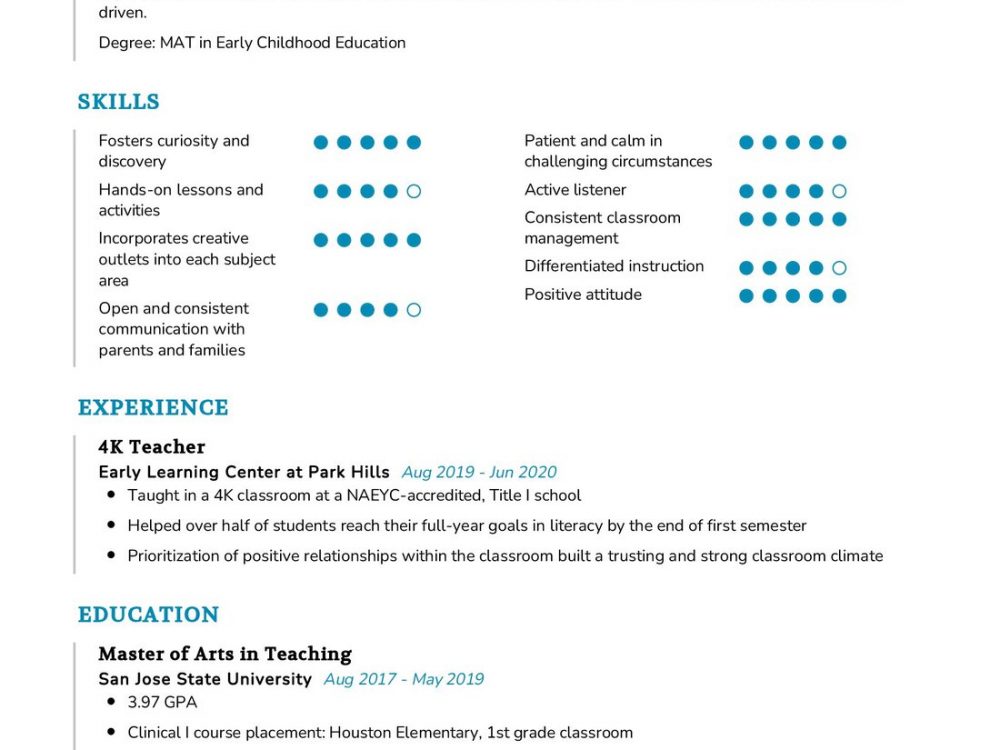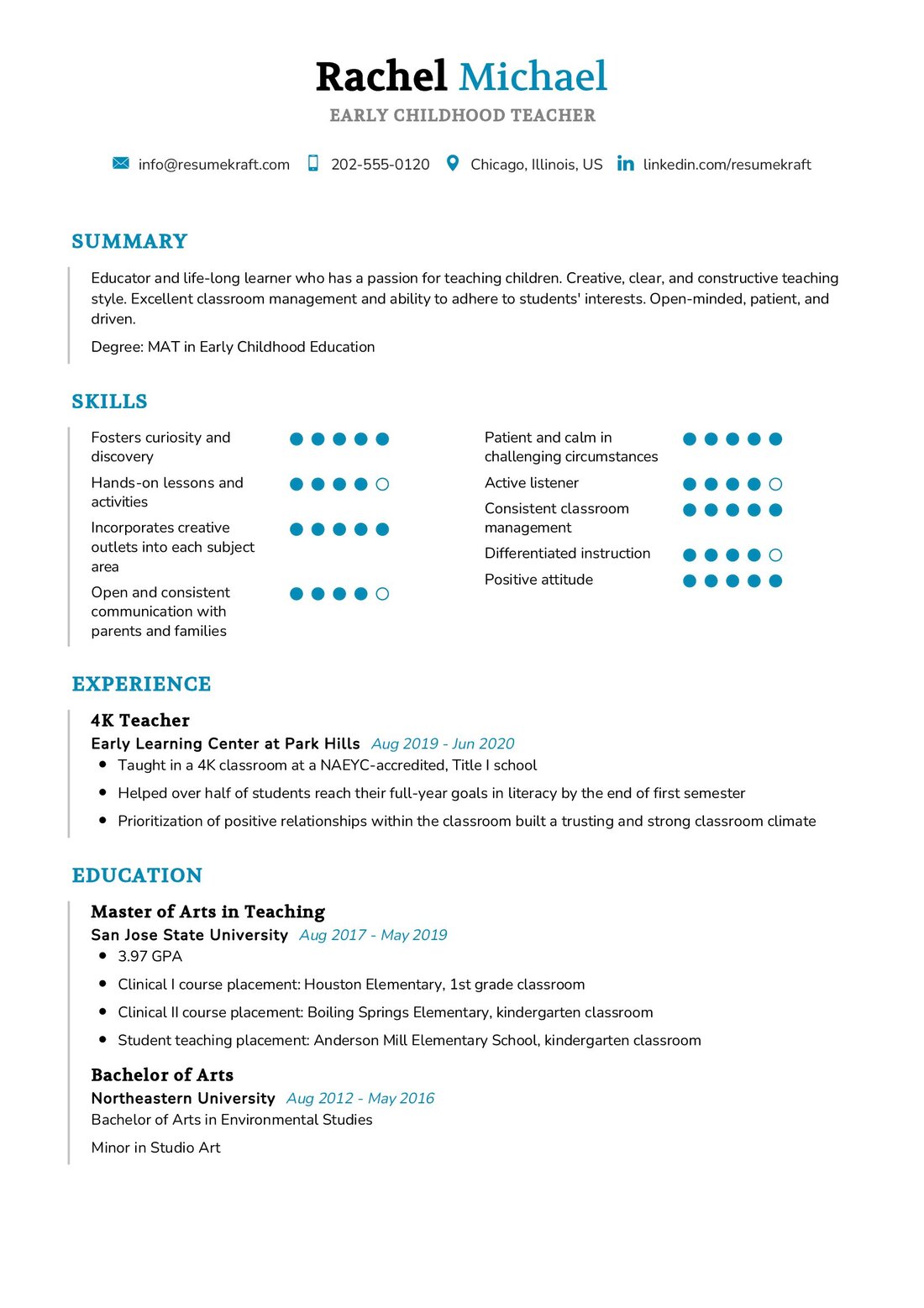What is the Role of an Early Childhood Teacher?
The role of an Early Childhood Teacher is both profound and transformative. These educators lay the foundation for a child’s lifelong learning journey, nurturing their innate curiosity and fostering a love for knowledge. Let’s delve deeper into the heartwarming and impactful role of an Early Childhood Teacher.
Early Childhood Teachers are specialized educators who work with children from birth to eight years old, a critical period in human development. They design and deliver age-appropriate curricula that stimulate young minds, ensuring that children acquire foundational skills in literacy, numeracy, and social interaction. Beyond academic learning, these teachers play a pivotal role in shaping a child’s emotional and social growth, instilling values of empathy, respect, and collaboration.
What are the Early Childhood Teacher Job Requirements?
Being an Early Childhood Teacher is a calling that demands specific qualifications and a deep passion for shaping young minds. Here are the essential requirements for this noble profession:
- A Bachelor’s degree in Early Childhood Education or a related field, ensuring a strong foundation in child development theories and practices.
- State-specific teaching certification or license, a testament to your commitment and expertise.
- Experience in classroom management, ensuring a safe and conducive learning environment.
- Proficiency in designing age-appropriate curricula that cater to diverse learning needs.
- Strong communication skills, vital for interacting with children, parents, and colleagues.
- A deep-seated passion for teaching and a genuine love for children.
Continuous professional development, through workshops and courses, can further enhance your profile and teaching methodologies.
What are the Responsibilities of an Early Childhood Teacher?
An Early Childhood Teacher wears many hats, from an educator and mentor to a caregiver and counselor. Let’s explore the myriad responsibilities that define this multifaceted role:
- Designing and implementing age-appropriate lesson plans that stimulate cognitive, emotional, and social growth.
- Creating a vibrant classroom environment that fosters curiosity and creativity.
- Assessing children’s developmental needs and tailoring instruction accordingly.
- Collaborating with parents, sharing insights on their child’s progress and suggesting ways to reinforce learning at home.
- Identifying any developmental delays or challenges and working with specialists to address them.
- Organizing field trips, workshops, and interactive sessions that provide experiential learning.
- Staying updated with the latest in early childhood education, ensuring that teaching methods are current and effective.
Each responsibility underscores the profound impact an Early Childhood Teacher has on shaping a child’s formative years.
Early Childhood Teacher Resume Writing Tips
Creating a compelling resume as an Early Childhood Teacher is about showcasing your passion, expertise, and the difference you’ve made in young lives. Here are some tips to help you craft a resume that resonates with your calling:
- Highlight specific instances where you’ve made a tangible difference, be it in a child’s academic journey or emotional growth.
- Detail any innovative teaching methodologies you’ve introduced and their impact.
- Include testimonials or feedback from parents or colleagues, adding authenticity to your achievements.
- List any additional certifications or workshops you’ve attended, showcasing your commitment to continuous learning.
- Personalize your resume for the specific role, weaving a narrative that aligns with the institution’s ethos and values.
Remember, your resume is a reflection of your journey, your dedication, and the lives you’ve touched along the way.
Early Childhood Teacher Resume Summary Examples
Your resume summary is the prologue to your career story, setting the tone for the chapters that follow. Here are some examples to inspire you:
- “Passionate Early Childhood Teacher with over 8 years of experience, dedicated to nurturing young minds and fostering a love for learning. Recognized for innovative teaching methodologies and impactful parent-teacher collaborations.”
- “Dedicated Early Childhood Teacher with a proven track record in holistic child development. Adept at creating inclusive classroom environments that cater to diverse learning needs.”
- “Experienced Early Childhood Teacher with a specialization in literacy development. Committed to creating vibrant learning spaces that inspire curiosity and creativity.”
Each summary offers a glimpse into your journey, your expertise, and your commitment as an Early Childhood Teacher.
Create a Strong Experience Section for Your Early Childhood Teacher Resume
Your experience section is a testament to your journey, highlighting the milestones you’ve achieved and the lives you’ve touched. Here are some examples to guide you:
Each experience underscores your impact as an Early Childhood Teacher, showcasing your dedication and expertise.
Sample Education Section for Your Early Childhood Teacher Resume
Your educational qualifications lay the foundation for your journey as an Early Childhood Teacher. Here’s how you can structure this section:
- M.Ed. in Early Childhood Education, Stanford University, Stanford, CA, 2018
- B.Ed. in Elementary Education, University of California, Los Angeles, CA, 2016
- Certified Early Childhood Educator, National Association for the Education of Young Children, 2017
Early Childhood Teacher Skills for Your Resume
As an Early Childhood Teacher, your skillset is a blend of academic expertise and innate qualities. Let’s list down the essential skills:
Soft Skills:
- Empathy and compassion, understanding the unique needs of each child.
- Communication, the ability to convey ideas effectively to children and adults alike.
- Creativity, designing engaging lesson plans that captivate young minds.
- Patience, guiding young learners with kindness and understanding.
- Teamwork, collaborating with colleagues, parents, and specialists.
Hard Skills:
- Curriculum design, tailoring instruction to diverse learning needs.
- Child psychology, understanding the developmental milestones and challenges of early childhood.
- Classroom management, creating a safe and conducive learning environment.
- Assessment and evaluation, tracking a child’s progress and identifying areas of improvement.
- Parent-teacher collaboration, partnering with parents to reinforce learning at home.
Most Common Mistakes to Avoid When Writing an Early Childhood Teacher Resume
While crafting your resume, it’s essential to be mindful of common pitfalls. Here are some mistakes to steer clear of:
- Using a generic template, missing the opportunity to showcase your unique journey.
- Overloading your resume with jargon, obscuring your true value.
- Ignoring the cover letter, a platform to narrate your story and connect with potential employers.
- Focusing solely on job duties, without highlighting your achievements and impact.
- Not proofreading, leaving room for errors that can tarnish your professional image.
Key Takeaways for Your Early Childhood Teacher Resume
As we wrap up, here are some pivotal points to remember:
- Showcase your journey, emphasizing the milestones achieved and the lives impacted.
- Highlight your expertise in early childhood education, detailing any specializations or certifications.
- Include testimonials or feedback, adding authenticity to your narrative.
- Personalize your resume, aligning it with the ethos and values of the institution you’re applying to.
Finally, to enhance your application and prepare for the Early Childhood Teacher job interview, feel free to utilize resources like AI Resume Builder, Resume Design, Resume Samples, Resume Examples, Resume Skills, Resume Help, Resume Synonyms, and Job Responsibilities.
With these insights, you’re poised to craft a resume that truly reflects your passion, dedication, and the profound impact you’ve had as an Early Childhood Teacher. Best wishes on your journey ahead!


